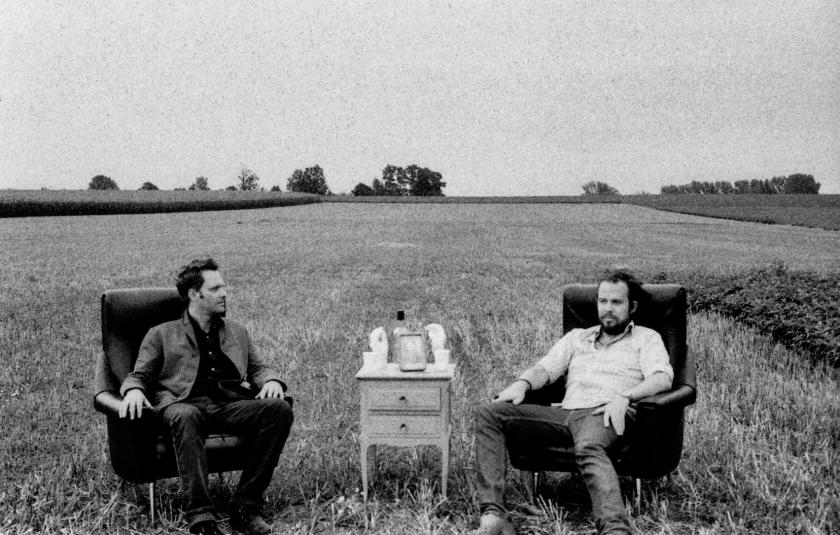Last night was about how few notes can be played, and how texture can offer them maximum effect. Five musicians strove to play the minimum with the greatest impact. Of course, that’s what Black Sabbath did at the very beginning, but A Winged Victory for the Sullen’s instrumentals are built from piano, treated guitar and strings. Yet, at times, they had the power of rock.
But this is classically slanted minimalism. A Winged Victory for the Sullen are composer Dustin O’Halloran and Adam Wiltzie, mainstay of Texan drone experimentalists Stars of the Lid and former associate of Sparklehorse. Together, they’ve created a music for their self-titled debut album that’s downbeat and compelling. Live, it became animated.
Although O'Halloran had preceded his soundtrack work with a couple of albums of solo piano pieces in the middle of last decade, A Winged Victory for the Sullen is certainly very now. It’s, despite O'Halloran and Wiltzie being American, part of something going on across (mainly northern) Europe, briefly dug into in theartsdesk's review of their album. The stately march of their music is also equally at home alongside that of Gavin Bryars and Harold Budd. Arvo Pärt and Dvořák are kindred spirits too. This obviously wasn’t going to be a get up, get on down evening.
The sounds that Adam Wiltzie produces are unrecognisable as that of a guitar - a distant foghorn, a church bell heard in reverse
As “Steep Hills of Vicodin Tears” reached its climax at Cecil Sharp House, O'Halloran’s repeated piano phrases competing with Wiltzie’s peals of treated guitar, the effect was close to that of rock, albeit rock with a pulse beat about to slide into suspended animation. The power from the stage wasn’t that of metal, and it wasn’t going to induce the seated audience to head bang. But in a parallel world, where rock hadn’t been invented, this would have substituted.
In their live form, the album’s compositions – all of which were played apart from “Minuet for a Cheap Piano Number Two” and “All Farewells are Sudden” – were more dynamic, the contrast between the textures of each instrument more apparent than on record. There were also wider variations in volume within each piece. The sounds that Wiltzie produces are unrecognisable as that of a guitar: a distant foghorn, a church bell heard in reverse, a pipe organ, or pink noise that’s tuned to a scale. He's not afraid of volume. His playing gave a colour to each instrumental, placing it in open space. O’Halloran’s grand pianos were absent, another factor setting the performance apart from the album. The string ensemble accompanying the duo – two violins and cello – brought flickering shadows to each piece.
Wiltzie had introduced the evening saying they were going to play “seven pieces of music about broken hearts and dead people”. Even with the lack of lyrics, it wasn't necessary to say anything. Mournfulness was inherent, especially in the sound of Hildur Gudnadóttir playing her cello across its bridge. Last night's set finished with a version of Arvo Pärt's devotional “Fratres for Cello and Piano”. Cecil Sharp House, the home of the The English Folk Dance and Song Society, isn’t a church but it might as well have been.
Watch A Winged Victory for the Sullen perform “We Played Some Open Chords and Rejoiced, for the Earth had Circled the Sun yet Another Year”















Add comment